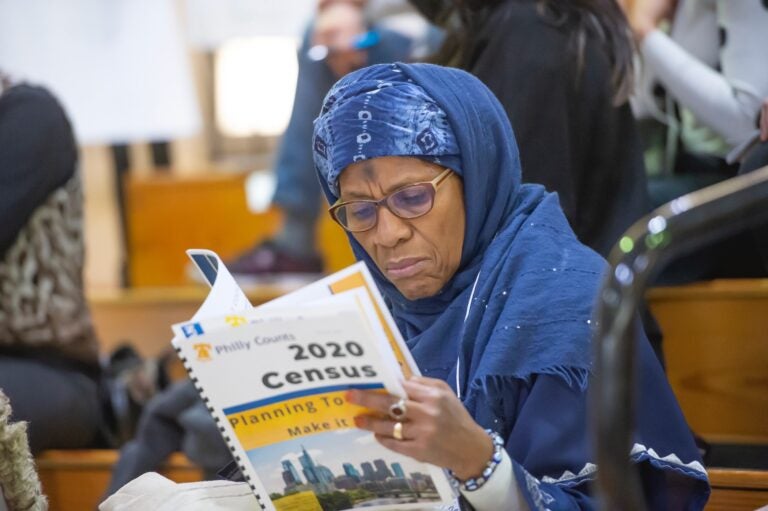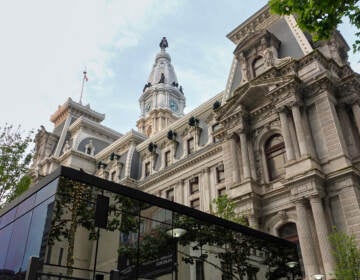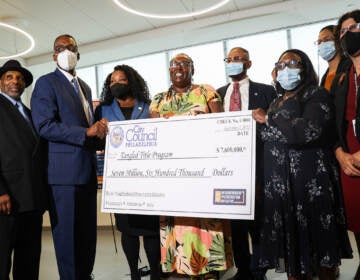Philly census push presses on despite challenges
In the Philly area, there's been a bigger push than ever to get everybody counted for the census. They're also facing big obstacles: a pandemic and a shortened deadline.
Listen 16:04
Ruqayya Ali of Center City peruses Philly Counts census literature during the Philly Counts 2020 summit at South Philadelphia High School. (Jonathan Wilson for WHYY)
Groups in the greater Philadelphia area have undertaken a major effort to get as many people counted in the 2020 census as possible — especially low-income communities of color, which are most likely to be undercounted and miss out on federal funding and political representation.
But, as WHYY reporter Ximena Conde tells The Why, census workers and volunteers are facing more headwinds than ever before. Thanks to the pandemic and a recently shortened deadline, the count is looking grim. Here’s how these groups are pressing on to get a more complete count.

Hear the whole story on The Why
Interview highlights
On how you’re counted if you don’t fill out the census
If you haven’t filled out the census yet, you can expect a handful of visits from enumerators. These are U.S. Census Bureau employees that carry a badge and they go to the homes of people who haven’t responded and they ask you to fill out the form. And they help you do it right there. They have little tablets, and it doesn’t take longer than 15, 20 minutes.
If for some reason, enumerators can’t get a hold of you, their backup strategy is to reach out to neighbors and try and get a demographic profile about you. And if that for some reason fails, too, the U.S. Census Bureau uses what they call statistical procedures to complete the demographic profile of your home. What they basically do is take an educated guess. They take previous census data and then also current census data to try and sort of narrow down who is living at this particular household that didn’t respond to the census form. And former census directors say this is a sure-fire way to over-count white, non-Hispanic populations and leave hard-to-count populations that are underrepresented. So think of homeless people, children, rural communities: they all tend to be under-counted if you use this sort of educated guessing method, and that means that these hard to count neighborhoods are losing out on federal funding and political representation.
On creative methods census volunteers are using
They’re really leaning in on those community partnerships. They’re connecting with churches and nonprofits who are willing to attach census information to say, you know, food boxes that they are sending out to families in need, as well as those organizations that are touching base with families affected by COVID-19 …
Volunteers have started doing the sort of quirky method of outreach using census caravans. So they drive out a bunch of cars into neighborhoods with low response rates, with poster boards and megaphones. Philly Counts has been targeting the events that are happening in Philadelphia, such as Philly Free Streets, dropping off swag bags for children. So there are onesies, there are T-shirts, there are cozies that say “U.S. Census” on it. And the idea behind that is, OK, if you give these young children these goody bags, they’ll go back home, their parents will see it, and maybe they’ll remember that, “Oh, hey, I haven’t filled out the census. I should do that.”
On the impact this could have beyond 2020
Remember, the results that we get from this year’s census will stick with us for the next 10 years. So if we mess this up, it’s a mistake that states will have to deal with for a whole decade before they get a chance to do it again. The pandemic has created a lot of challenges for everyone, and it’s easy to forget about the census and put it as a low priority item. But not participating could affect your neighborhood in terms of funding and representation that last until at least 2030.
 WHYY is one of over 20 news organizations producing Broke in Philly, a collaborative reporting project on solutions to poverty and the city’s push towards economic justice. Follow us at @BrokeInPhilly.
WHYY is one of over 20 news organizations producing Broke in Philly, a collaborative reporting project on solutions to poverty and the city’s push towards economic justice. Follow us at @BrokeInPhilly.
WHYY is your source for fact-based, in-depth journalism and information. As a nonprofit organization, we rely on financial support from readers like you. Please give today.






